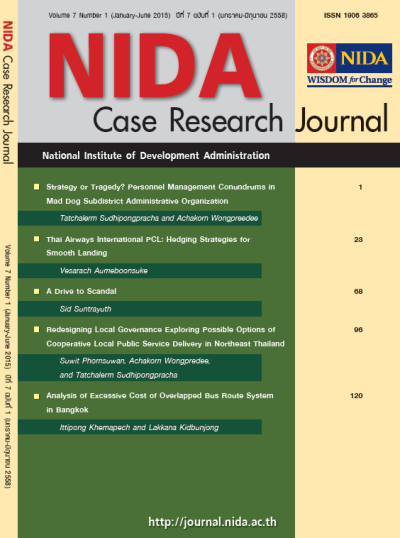Strategy or Tragedy? Personnel Management Conundrums in Mad Dog Subdistrict Administrative Organization
Keywords:
Thai Local Government, Public Personnel Management, DecentralizationAbstract
This case focuses on the personnel management problems in a small local administrative organization in rural Thailand—the Mad Dog subdistrict administrative organization led by Mayor Yai. It offers an in-depth description of Thailand’s complex intergovernmental relations in which local government agencies play an interestingly minor role in determining important policies and programs. Although a strong and capable workforce helps ensure the quality and efficiency of public services, local government agencies in Thailand and elsewhere must work under multiple constraints that complicate their rational human resource planning and management.
In this case, the focal problem is caused by from three employment incentive programs initiated by the Ministry of Interior and the National Commission on Local Government Personnel and Standards. The first program requires all local administrative organizations in Thailand to provide baccalaureate and post-baccalaureate scholarships for their officials. In the second program, local administrative organizations have been mandated by the National Commission on Local Government Personnel and Standards to subsidize all social security contributions for their employees. The third employment incentive program is the local officials’ annual bonus program funded by each local government’s budget surplus.
With these three incentive instruments sanctioned by national government agencies, the Mad Dog SAO has been able to attract individuals with high academic and professional caliber to fill up many administrative positions. However, when representatives from the Public Finance Audit Commission (PFAC) came to the Mad Dog SAO for an annual financial audit, it was discovered that the three programs violate the interior ministry’s Ministerial Rules and Regulations of the Budgetary Procedures in Local Administrative Organizations (B.E. 2541) by illegally creating new expenditure categories. In the PFAC financial audit report, the Mad Dog SAO is required to recall all the money given to its local government officials through those programs.
As the Mad Dog subdistrict’s chief executive, Mayor Yai—the focal manager in this case—must adhere to the PFAC guidelines because failure to do so could result in criminal charges by the National Anti-Corruption Commission (NACC). However, Mayor Yai must tread carefully on the legal issues raised by the PFAC; any bold move to rectify this situation will certainly have a negative effect on the SAO officials’ morale. Additionally, for the long-term organizational interest, the Mad Dog SAO administrators have to come up with alternative employer incentive programs that are both legal and capable of enhancing the SAO’s human resources.





